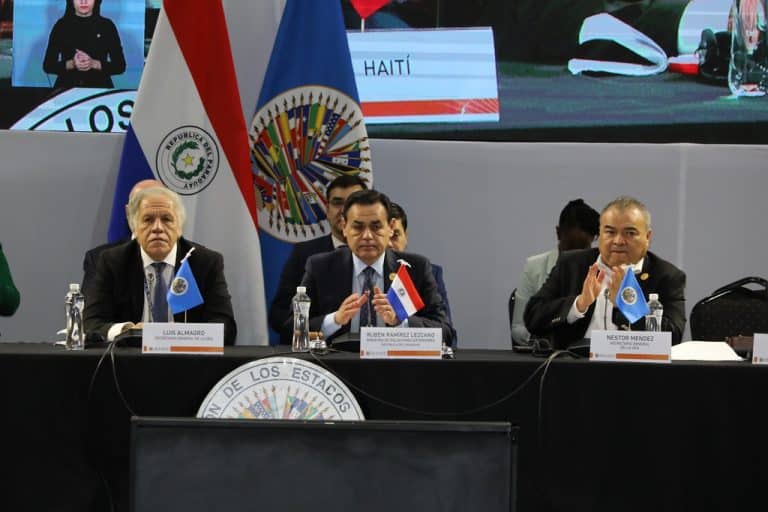28 de junio 2024

Children of Exile: The Births “Sowing Hope” in the Camp of Nicaraguan Farmers

PUBLICIDAD 1M
PUBLICIDAD 4D
PUBLICIDAD 5D
Resolution demands the release of political prisoners and promotes that the Permanent Council of the OAS continue to report on situation in Nicaragua

Foto: Agustín Cazal/OAS
The foreign ministers gathered at the 54th General Assembly of the Organization of American States (OAS), held in Asuncion, Paraguay, approved by acclamation a resolution urging “the States of the hemisphere to redouble their efforts to facilitate, through individual or collective actions, the cessation of human rights violations” in Nicaragua.
The resolution, approved by the 32 OAS member countries — Nicaragua and Venezuela are not part of the regional OAS organization — demands that the regime of Daniel Ortega and Rosario Murillo “immediately and unconditionally release all persons who have been deprived of their liberty for political or religious reasons.”
The resolution was promoted by Canada, Chile, Costa Rica, the Dominican Republic, the United States, Argentina, Uruguay, Peru, and Antigua and Barbuda.
The resolution calls on OAS member states to take measures to “end ideological persecution whether political or religious” in Nicaragua.
It also urges “the cessation of all human rights violations and to take effective measures for the restoration of democratic institutions, especially their obligation to observe the rule of law and human rights.”
The text details the displacement situation of more than 270,000 Nicaraguans who have sought asylum worldwide and expresses concern about the suppression of civic spaces through the cancellation of more than 3,000 civil society organizations, the deprivation of nationality and political rights of more than 300 people, the closure or confiscation of at least 54 media outlets, and the forced exile of more than 250 journalists.
The resolution titled “Monitoring the Situation in Nicaragua” states that it is necessary to restore the right of Nicaraguans to enter and leave the country and insists “on the immediate end to the impunity of state institutions and individuals who perpetrated serious human rights violations.”
It also requests the regime to respect all measures granted by the Inter-American Human Rights Council and “to refrain from arbitrarily repressing and detaining evangelical church leaders, and to provide information on the physical and psychological health of the eleven religious leaders of Puerta de la Montaña,” who are detained in maximum security facilities.
Additionally, it urges the Government of Nicaragua to “constructively engage with the inter-American human rights system, facilitating international scrutiny within the framework of international law, allowing the entry of the Inter-American Commission on Human Rights and its special follow-up mechanism, as well as other competent international bodies.”
Nicaragua left the OAS on November 19, 2023, becoming the second Latin American country to voluntarily leave the organization, after Venezuela.
Nicaragua’s exit from the OAS occurred upon the completion of two years since the Ortega-Murillo regime denounced the organization’s Charter. The dictatorship alleged “constant interventionist attitudes” of the regional organization, related to the approval of resolutions that condemned its abuses against the Nicaraguan people.
Human rights violations in Nicaragua make the OAS task the Permanent Council with staying informed within the framework of Inter-American instruments about the situation in Nicaragua, “facilitating and coordinating dialogue, negotiation, and visibility initiatives towards the objectives of this resolution, and within the limits of international law.”
This article was published in Spanish in Confidencial and translated by Havana Times. To get the most relevant news from our English coverage delivered straight to your inbox, subscribe to The Dispatch.
PUBLICIDAD 3M
Confidencial es un diario digital nicaragüense, de formato multimedia, fundado por Carlos F. Chamorro en junio de 1996. Inició como un semanario impreso y hoy es un medio de referencia regional con información, análisis, entrevistas, perfiles, reportajes e investigaciones sobre Nicaragua, informando desde el exilio por la persecución política de la dictadura de Daniel Ortega y Rosario Murillo.
PUBLICIDAD 3D